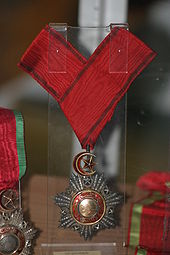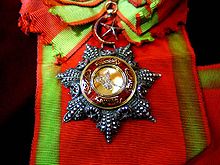- Order of the Medjidie
-


Medjidie or Mejidie (Turkish: Mecidiye, August 29, 1852-1922[1]) is the name of a military and knightly order of the Ottoman Empire. The Order was instituted in 1851 by Sultan Abdülmecid I.[2]
Contents
Order of the Medjidie
Instituted in 1851, the Order was awarded in five classes, with the First Class being the highest. The Order was issued in considerable numbers by Sultan Abd-ul-Mejid I as a reward for distinguished service to members of the British Army and the Royal Navy and the French Army who came to the aid of the Ottoman Empire during the Crimean War against Russia. In Britain it was worn after any British gallantry and campaign medals awarded, but before the Turkish Crimean War medal. The Order was usually conferred on officers but a few enlisted soldiers also received it in a lower class. During World War I it was also awarded to a number of German and Austrian officers.
The Order was often conferred on non-Turkish nationals.
Design of the Order
On the obverse of the star is Sultan Abdul Mejid's royal cipher surrounded by an inscription on a gold-bordered circle of red enamel; all on a star of seven triple quills with small crescents and five-pointed stars between them, suspended from a red enameled crescent and star suspender with green enameled edges.
The order has 5 classes. First, second, third and fourth classes are gold. Fifth (lower) class is silver.
Owners of the order:- First Class Order (Gold) - 50 people (Given by Sultan)
- Second Class Order (Gold) - 150 people (Given by Sultan)
- Third Class Order (Gold) - 800 people
- Fourth Class Order (Gold) - 3,000 people
- Fifth Class Order (Silver) - 6,000 people
Some recipients
- Abd al-Qadir al-Jaza'iri, Algerian Islamic scholar and political and military leader who led a struggle against the French invasion.
- Napoleon III, Emperor of France ;
- Abraham Ashkenazi, chief rabbi of Palestine.
- Maréchal Vaillant
- Henri de Testa, ministre d'Autriche à Athènes ;
- Alfred de Testa, baron de Testa, avocat ;
- Léopold de Testa, avocat et écrivain ;
- Joséphine Rostkowska, aide-chirurgien ;
- Jean François Jules Herbé, militaire français ;
- Charles Joseph Dumas-Vence, contre-amiral français ;
- Louis Toussaint Doutrelaine, militaire français ;
- Jules Pierre Duhamel Grandprey, militaire français ;
- Pierre Louis Charles de Failly, militaire français ;
- Jules Étienne Marie Forgeot, militaire français ;
- Pierre Joseph Jeanningros, militaire français ;
- Frédéric Labé, militaire français ;
- Auguste Lumière, industriel et biologiste français ;
- Léon-Eugène Méhédin, architecte et photographe français ;
- Charles-Nicolas Michelet, militaire français ;
- Alphonse Nothomb, homme politique belge ;
- Vitalis Pacha, militaire turc ;
- Jules Ernest Renoux, peintre français;
- Pierre-Auguste Sarrus, musicien français ;
- Jules-Dominique Brion, militaire français ;
- Stanislaw Graham Bower St. Clair, militaire angleterre
Notes
- ^ Bir Onurlandırma Aracı olarak Osmanlı Nişan ve Madalyaları, Osmanlı Bankası Arşiv ve Araştırma Merkezi. (Turkish)
- ^ The Americana, Vol.15, Ed. Frederick Converse Beach, George Edwin Rines, (1912);[1]
References
- The Americana, Vol.15, Ed. Frederick Converse Beach, George Edwin Rines, 1912.
External links
 This article incorporates text from a publication now in the public domain: Chisholm, Hugh, ed (1911). Encyclopædia Britannica (11th ed.). Cambridge University Press.
This article incorporates text from a publication now in the public domain: Chisholm, Hugh, ed (1911). Encyclopædia Britannica (11th ed.). Cambridge University Press.
This Ottoman Empire-related article is a stub. You can help Wikipedia by expanding it.


